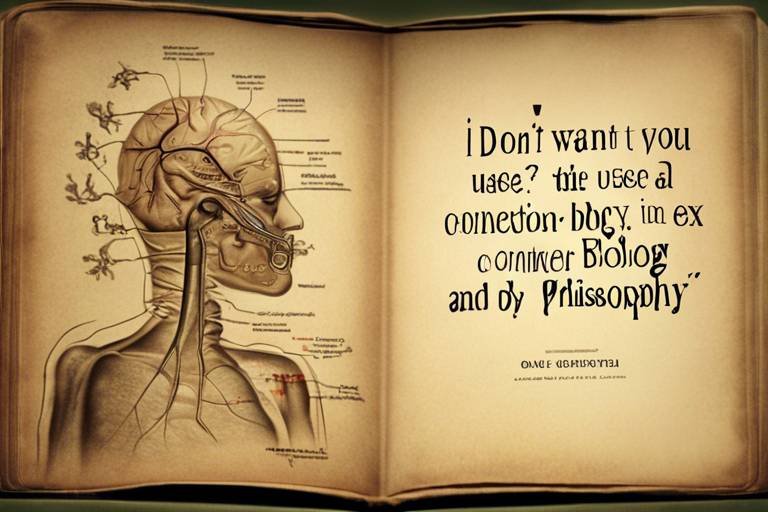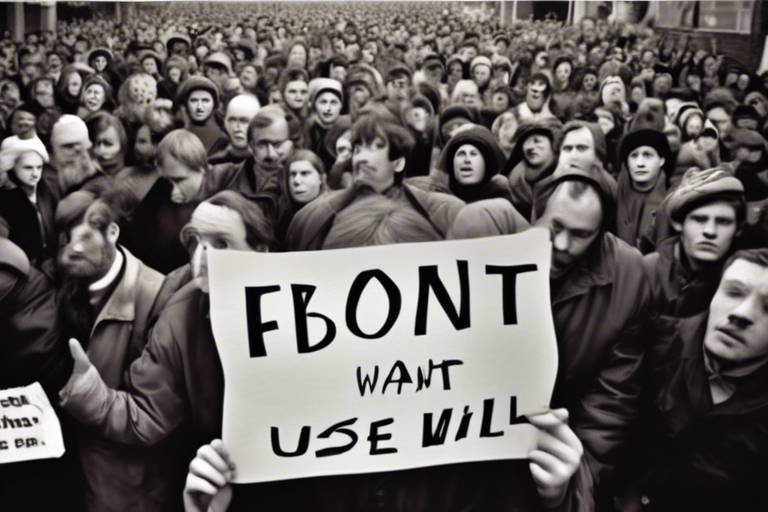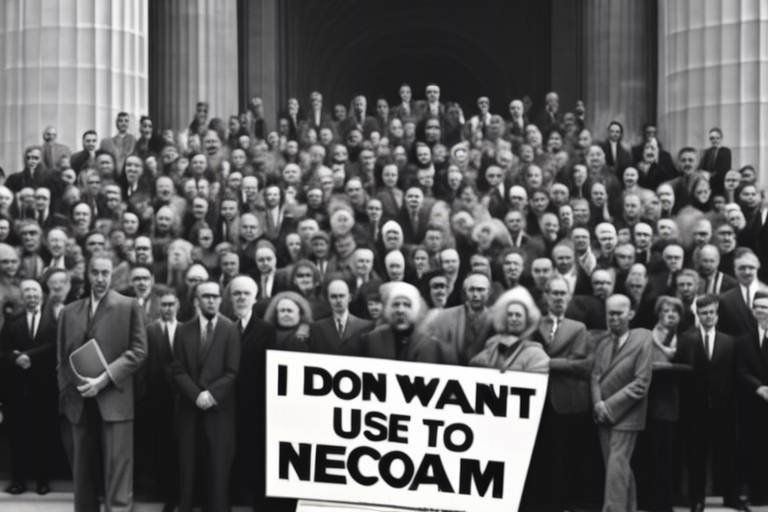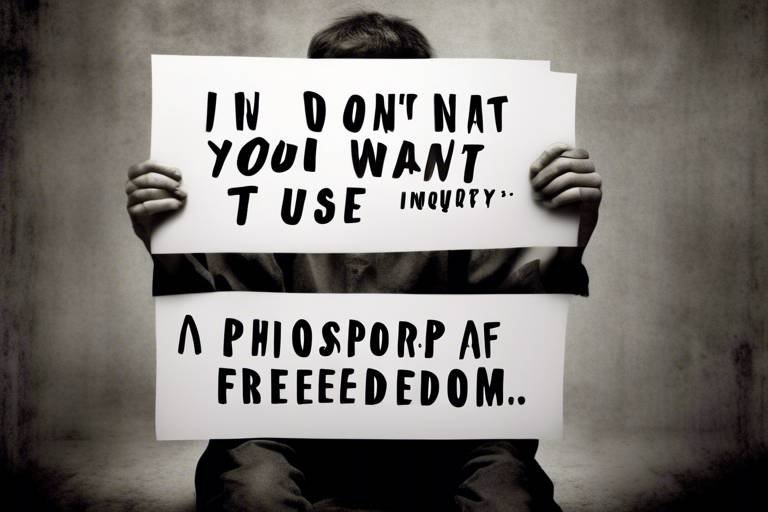The Effectiveness of Metaphors in Philosophical Inquiry
Have you ever tried to explain a complex idea and found yourself fumbling for the right words? This is where metaphors come in, acting as bridges that connect the familiar with the unfamiliar. In philosophical inquiry, metaphors are not just decorative language; they are essential tools that enhance our understanding of intricate concepts. By transforming abstract ideas into relatable imagery, metaphors allow us to grasp nuances that might otherwise remain elusive. Think of them as a pair of glasses that help to clarify blurry thoughts, making the abstract concrete and the complex comprehensible.
Metaphors serve multiple roles in philosophical discourse. They can illuminate, provoke thought, and even challenge existing paradigms. For instance, when we describe the mind as a "computer," we are not just making a comparison; we are framing our understanding of consciousness in a way that resonates with our technological age. This analogy not only simplifies the concept but also opens up avenues for discussion about the nature of thought, memory, and artificial intelligence. In this way, metaphors act as a lens through which we can explore philosophical questions, offering fresh perspectives and deeper insights.
Moreover, the effectiveness of metaphors lies in their ability to evoke emotions and personal connections. When philosophers use metaphors, they tap into our shared human experiences, making their arguments more relatable. Imagine discussing the concept of "freedom" without evoking images of open skies or unchained souls. Such imagery not only emphasizes the importance of freedom but also stirs feelings of hope and aspiration. By engaging our emotions, metaphors enrich philosophical discussions, making them not just intellectual exercises but also deeply personal journeys.
However, it’s crucial to recognize that while metaphors can be powerful, they also come with their own set of challenges. A metaphor that works well in one context may fall flat in another, leading to misunderstandings or oversimplifications. For example, if one were to frame morality as a "game," it might suggest that ethical decisions are merely strategic moves rather than profound moral choices. This highlights the importance of using metaphors judiciously, ensuring they serve to enhance clarity rather than obscure meaning.
In summary, the effectiveness of metaphors in philosophical inquiry cannot be overstated. They are vital in simplifying complex ideas, evoking emotions, and facilitating deeper understanding. As we continue to engage with philosophical discourse, it’s essential to appreciate the power of metaphors and to wield them wisely. After all, in the world of philosophy, where the abstract often reigns, metaphors can be the key that unlocks new realms of thought.
- What is a metaphor? A metaphor is a figure of speech that describes an object or action in a way that isn’t literally true, but helps explain an idea or make a comparison.
- Why are metaphors important in philosophy? Metaphors help clarify complex concepts, making them more accessible and relatable, thus enhancing understanding and engagement in philosophical discussions.
- Can metaphors be misleading? Yes, while metaphors can illuminate, they can also oversimplify or misrepresent ideas if not used carefully.
- How can I use metaphors effectively? To use metaphors effectively, ensure they resonate with your audience and accurately represent the concepts you are discussing, avoiding potential confusion.

Understanding Metaphors in Philosophy
Metaphors are not just decorative language; they are powerful cognitive tools that shape our understanding of the world, especially in the realm of philosophy. At their core, metaphors allow us to grasp complex and abstract ideas by relating them to more familiar concepts. Think of metaphors as bridges that connect the known to the unknown, making the intricate landscape of philosophical thought more navigable. For instance, when we say that "time is a thief," we are not just being poetic; we are using a metaphor to convey the idea that time can take away our moments in life, much like a thief takes away possessions. This simple phrase encapsulates a profound truth about human experience.
In philosophical inquiry, metaphors serve a dual purpose. First, they enhance clarity by simplifying complex theories. When philosophers employ metaphors, they create a visual representation of their ideas, which can be easier for audiences to digest. Second, metaphors deepen our understanding by inviting us to explore the nuances of a concept. They encourage us to draw parallels between seemingly unrelated ideas, leading to richer discussions and insights. For example, the metaphor of a "moral compass" suggests that our ethical decisions are guided by an internal sense of direction, prompting us to reflect on our values and choices.
Moreover, metaphors are ubiquitous in philosophical discourse, appearing in various contexts ranging from ethics to metaphysics. They are not merely linguistic flourishes; they are fundamental to how we think and communicate about philosophical issues. Consider the metaphor of "life as a journey." This perspective influences how we view our experiences, challenges, and growth. It frames our existence in a way that emphasizes progress and exploration, rather than stagnation.
Despite their significance, it's essential to recognize that metaphors come with their own set of limitations. While they can illuminate certain aspects of a concept, they can also obscure others. The very nature of a metaphor is to draw a comparison, which means that it might neglect critical differences between the ideas being compared. For instance, if we view "justice" solely through the lens of "balance," we may overlook other dimensions of justice, such as fairness and retribution. Thus, while metaphors can enrich our philosophical inquiries, they require careful consideration and critical analysis.
In summary, metaphors are vital in philosophical inquiry, acting as both illuminators and potential pitfalls. They help us articulate and explore complex ideas, but they also necessitate a critical approach to ensure that we do not become overly reliant on them. As we delve deeper into philosophical discussions, we must remain aware of the power of metaphors and use them judiciously to enhance our understanding rather than hinder it.

The Role of Metaphors in Thought
Metaphors are not just fancy figures of speech; they are fundamental to how we think and understand the world around us. Imagine trying to grasp the concept of time without referring to it as a "river" flowing endlessly. This metaphor not only provides a visual representation but also evokes feelings and associations that help us comprehend the abstract nature of time. In philosophical discourse, metaphors serve as a bridge between the tangible and the intangible, allowing us to navigate complex ideas with greater ease.
When we engage with philosophical concepts, our brains often rely on metaphors to create mental models. These models act as cognitive scaffolding, enabling us to build our understanding step by step. For instance, consider the metaphor of "life as a journey." This simple phrase encapsulates a wealth of meaning, suggesting that life has a direction, involves challenges, and requires choices. Such metaphors are not merely decorative; they shape our perceptions and influence our reasoning.
One of the most significant impacts of metaphors in thought is their ability to facilitate deeper understanding. They can illuminate relationships between ideas that might otherwise remain obscured. For example, when discussing justice, one might refer to it as a "scale" that needs balance. This metaphor highlights the need for fairness and equality, prompting us to think critically about how justice is administered in society. By framing concepts in relatable terms, metaphors encourage us to engage with them on a more personal level.
However, it's crucial to recognize that metaphors can also limit our thinking. They can create boundaries around how we interpret ideas, leading to potential misunderstandings. For instance, if we think of knowledge as a "light," we might overlook the idea that knowledge can also be heavy, burdensome, or even blinding. Thus, while metaphors are invaluable tools for understanding, they come with their own set of challenges. It’s a bit like trying to see the full picture through a keyhole; we get a glimpse, but not the whole view.
In summary, metaphors play a vital role in shaping our thoughts and philosophical inquiries. They provide clarity, foster deeper connections, and help us navigate the often murky waters of complex ideas. Yet, we must remain vigilant about their limitations, ensuring that we do not become too entrenched in a single metaphorical framework. By embracing a variety of metaphors, we can enrich our understanding and engage more fully with the philosophical questions that challenge us.
- What is a metaphor? A metaphor is a figure of speech that describes an object or action in a way that isn’t literally true, but helps explain an idea or make a comparison.
- How do metaphors influence our thinking? Metaphors shape our understanding by providing relatable frameworks that help us visualize and comprehend complex concepts.
- Can metaphors be misleading? Yes, while metaphors can enhance understanding, they can also limit our perspective and lead to misunderstandings if taken too literally.
- Why are metaphors important in philosophy? Metaphors are crucial in philosophy because they help clarify abstract ideas, making them more accessible and relatable to a broader audience.

Metaphors and Conceptual Frameworks
Metaphors play an essential role in shaping our understanding of complex philosophical ideas, acting as bridges that connect the abstract to the concrete. Imagine trying to explain the concept of freedom without a metaphor; it would be like trying to paint a vivid picture without colors. Metaphors provide a framework through which we can interpret and internalize challenging concepts, making them more accessible and relatable. By framing ideas in familiar terms, metaphors allow us to grasp intricate theories and arguments with greater clarity.
Consider the metaphor of a journey often used to describe personal growth or the pursuit of knowledge. This imagery evokes a sense of progression, obstacles, and destinations, allowing us to visualize philosophical exploration as an adventure rather than a mere accumulation of facts. When philosophers describe life as a journey, they invite us to reflect on our experiences, choices, and the paths we take. This metaphor not only enriches our understanding but also engages our emotions, making philosophical discussions more impactful.
Moreover, metaphors often serve as conceptual frameworks that shape the way we approach philosophical arguments. For instance, the metaphor of a web can illustrate the interconnectedness of various ideas within a philosophical system. Just as a web consists of numerous threads that support each other, philosophical concepts can be seen as interlinked, where the understanding of one idea enhances our comprehension of another. This interconnectedness encourages deeper exploration and critical thinking, prompting us to question and analyze the relationships between different philosophical principles.
However, while metaphors can illuminate our understanding, they can also impose limitations. The very nature of a metaphor is to simplify complex ideas, which can lead to oversimplification or misinterpretation. For example, if we solely view ethical dilemmas through the lens of a battle metaphor, we might overlook the nuances of compassion and empathy that are crucial in moral discussions. Thus, while metaphors provide valuable frameworks, it is essential to remain aware of their potential to distort or constrain our understanding.
In conclusion, metaphors are not just decorative language; they are powerful cognitive tools that shape our philosophical inquiry. They provide the structure necessary to navigate abstract concepts, enhancing our ability to engage with and understand deep philosophical questions. As we continue to explore the role of metaphors in philosophy, it becomes increasingly clear that they are vital for both clarity and depth in our discourse.

Examples of Metaphorical Frameworks
Metaphorical frameworks are like the scaffolding of philosophical thought; they help us construct our understanding of complex ideas and theories. One of the most notable examples is the “Ship of Theseus” metaphor, which raises profound questions about identity and change. Imagine a ship that has had all its wooden parts replaced over time. Is it still the same ship? This metaphor serves as a powerful tool for discussing issues of personal identity and the nature of objects, prompting us to consider what it means for something to remain the same despite changes.
Another compelling example is the metaphor of the “Cave” from Plato's Allegory of the Cave. In this framework, prisoners are chained inside a dark cave, only able to see shadows cast on the wall. This metaphor illustrates the difference between the world of appearances and the world of reality, inviting us to question our perceptions and seek deeper truths. It emphasizes the importance of enlightenment and the philosophical journey toward understanding.
In ethics, the metaphor of the “Trolley Problem” is frequently employed to discuss moral dilemmas. Picture a trolley heading towards five people tied to the tracks. You have the option to pull a lever, redirecting the trolley to another track where it will hit one person instead. This metaphorical scenario forces us to confront difficult questions about utilitarianism, sacrifice, and the value of human life. It serves as a framework for analyzing ethical principles and decision-making processes.
Furthermore, the metaphor of the “Social Contract” serves as a foundational framework in political philosophy. It suggests that individuals consent, either explicitly or implicitly, to form a society and abide by its rules in exchange for protection and social order. This metaphor helps to clarify the relationship between the individual and the state, highlighting the importance of collective agreements in shaping governance.
These examples illustrate how metaphors can provide structure and clarity to philosophical arguments, enabling us to navigate complex ideas with greater ease. However, it's essential to remember that while metaphors can illuminate, they can also obscure. As we engage with these frameworks, we must remain vigilant about their limitations and the potential for misinterpretation.

Limitations of Metaphorical Frameworks
While metaphors can be incredibly powerful in shaping our understanding of complex philosophical ideas, they are not without their limitations. One of the primary concerns with metaphorical frameworks is that they can sometimes oversimplify intricate concepts. Just like a map can never truly capture the entirety of a landscape, metaphors can reduce the richness of philosophical discourse to mere caricatures. This oversimplification can lead to misunderstandings, where the essence of a philosophical argument is lost in translation.
Additionally, metaphors can create biases in how we perceive and interpret ideas. For instance, if we describe life as a "journey," we may unconsciously adopt a linear perspective, overlooking the complexities and non-linear experiences that life entails. This can result in a narrow understanding of philosophical issues. In some cases, metaphors can also reinforce stereotypes or cultural biases, leading to a skewed interpretation of ethical dilemmas or social issues.
Moreover, the effectiveness of a metaphor can vary significantly depending on the audience. What resonates with one group may fall flat or even confuse another. For example, a metaphor drawn from technology might be clear to a tech-savvy audience but obscure to those less familiar with digital concepts. This variability can hinder effective communication in philosophical discussions, making it crucial for philosophers to be mindful of their audience when employing metaphorical language.
Another limitation lies in the potential for metaphors to mislead. For instance, using the metaphor of "war" in discussing social issues can evoke aggressive responses and conflict-oriented thinking, which may not be conducive to constructive dialogue. The choice of metaphor can thus shape not only understanding but also the emotional response to philosophical inquiries.
In summary, while metaphors are invaluable tools in philosophical discourse, they come with inherent limitations that must be acknowledged. To navigate these challenges, philosophers should strive for a balance between utilizing metaphors for clarity and remaining aware of their potential pitfalls. By doing so, they can foster richer, more nuanced discussions that honor the complexity of the ideas at hand.
- What are the main limitations of using metaphors in philosophy? Metaphors can oversimplify complex ideas, create biases, vary in effectiveness among audiences, and potentially mislead discussions.
- How can philosophers mitigate the limitations of metaphors? By being mindful of their audience, choosing metaphors carefully, and balancing clarity with complexity, philosophers can enhance understanding while minimizing confusion.
- Why are metaphors important in philosophical inquiry? They help clarify abstract concepts, shape our thinking, and provide frameworks for understanding intricate ideas.

Metaphors in Ethical Philosophy
When we dive into the realm of ethical philosophy, we quickly discover that metaphors are not just embellishments; they are vital instruments that help us navigate the murky waters of moral dilemmas. Think of them as the compass that guides us through the fog of complex ethical decisions. For instance, when we talk about “the slippery slope” in ethical discussions, we’re using a metaphor that vividly illustrates how small, seemingly benign actions can lead us down a path of serious moral consequences. This metaphor not only paints a clear picture but also prompts us to consider the weight of our choices.
Metaphors serve to simplify the intricate web of ethical principles, making them more relatable and digestible. They connect abstract ethical theories to everyday experiences, allowing us to grasp difficult concepts through familiar imagery. For example, the metaphor of “the moral landscape” invites us to visualize ethical choices as a terrain we must navigate, filled with peaks of rightness and valleys of wrongness. This perspective encourages individuals to reflect on their moral paths and the implications of their decisions.
Moreover, metaphors can evoke emotional responses, which are crucial in ethical discussions. By framing a moral issue in a compelling way, metaphors draw people in and encourage them to engage with the subject matter on a deeper level. Consider the metaphor of “the social contract,” which suggests an implicit agreement among individuals to form a society. This idea resonates strongly with our understanding of community and responsibility, prompting us to think critically about our roles within society.
However, while metaphors are powerful, they come with their own set of challenges. The risk of oversimplification is ever-present. A metaphor can sometimes lead to misunderstandings or misinterpretations of ethical principles. For instance, if we frame a complex ethical issue solely as a battle between good and evil, we might overlook the nuanced factors that contribute to a decision. This is where the limitations of metaphorical thinking come into play, as it can sometimes confine our understanding rather than expand it.
In summary, metaphors in ethical philosophy are more than mere linguistic flourishes; they are essential tools that enhance our comprehension of moral issues. By bridging the gap between abstract ideas and tangible experiences, metaphors help illuminate the path toward ethical clarity. As we continue to explore the intricate landscape of ethical philosophy, we must remain vigilant about both the power and the pitfalls of metaphorical language.
- What is the role of metaphors in ethical decision-making? Metaphors help clarify complex moral dilemmas by providing relatable imagery that simplifies abstract concepts.
- Can metaphors mislead in ethical discussions? Yes, while metaphors can enhance understanding, they can also oversimplify issues and lead to misunderstandings.
- How do metaphors influence our moral reasoning? Metaphors shape our perceptions and emotional responses, guiding us in how we interpret ethical principles and make decisions.

Impact of Metaphors on Philosophical Discourse
Metaphors are not just embellishments in philosophical writing; they are essential instruments that shape the way we communicate complex ideas. When philosophers employ metaphors, they do more than paint vivid pictures; they create bridges between abstract concepts and our everyday understanding. This impact can be seen in various ways, influencing both the content and the form of philosophical discourse.
One of the most significant effects of metaphors is their ability to clarify and simplify intricate arguments. For instance, when a philosopher uses the metaphor of a "moral compass," they provide a relatable image that helps readers grasp the notion of ethical direction. This simplification is crucial, especially in a field where ideas can often feel overwhelmingly complex. By framing discussions in more accessible terms, metaphors enhance comprehension and retention of philosophical concepts.
Moreover, metaphors can also serve to evoke emotional responses. When discussing topics such as justice or freedom, metaphors like "the chains of oppression" or "the light of liberty" resonate on a deeper level, stirring feelings that can motivate readers to engage with the material more passionately. This emotional engagement can lead to a more profound understanding of the philosophical issues at hand, as it connects the reader's personal experiences with abstract theories.
However, it’s important to recognize that while metaphors can enhance understanding, they also have the potential to limit it. A metaphor that is too narrow or misleading can skew the interpretation of a philosophical argument. For instance, if one were to liken the mind to a "computer," it might lead to oversimplifications about human consciousness and creativity. This duality highlights the need for careful consideration when using metaphors in philosophical discourse.
To illustrate the impact of metaphors in philosophical discussions, let’s consider a few examples:
| Metaphor | Philosophical Context | Impact |
|---|---|---|
| "The Ship of Theseus" | Identity and Change | Challenges our understanding of what constitutes identity over time. |
| "The Veil of Ignorance" | Justice and Ethics | Encourages impartiality in moral reasoning. |
| "Life as a Journey" | Existentialism | Frames life experiences as a series of choices and paths. |
In summary, metaphors significantly shape philosophical discourse by enhancing clarity, evoking emotions, and framing complex ideas in relatable terms. They act as both a tool for understanding and a potential pitfall if not used judiciously. As philosophers continue to explore the depths of human thought, the role of metaphors will undoubtedly remain a vital area of inquiry.
- Why are metaphors important in philosophy?
Metaphors help clarify complex ideas, making them more accessible and relatable to readers. - Can metaphors mislead in philosophical arguments?
Yes, if a metaphor is too narrow or misleading, it can distort the understanding of a philosophical concept. - How do metaphors evoke emotions in philosophical discourse?
By using relatable images, metaphors can connect abstract ideas to personal experiences, stirring emotional responses.

Case Studies in Philosophical Metaphors
When we dive into the world of philosophical metaphors, it’s like opening a treasure chest filled with gems that illuminate complex ideas. One of the most celebrated examples is Plato's Allegory of the Cave. Here, Plato uses the metaphor of prisoners chained in a cave, only able to see shadows of objects behind them, to illustrate the difference between the world of appearances and the world of reality. This metaphor not only captivates the imagination but also compels us to reflect on our understanding of knowledge and enlightenment.
Another fascinating case study is found in Immanuel Kant's concept of the "Kingdom of Ends". Kant uses this metaphor to describe a moral community where every rational being is treated as an end in themselves, not merely as a means to an end. This metaphor serves as a powerful framework for ethical discussions, prompting us to consider the implications of our actions on others and the importance of respect in moral philosophy.
Furthermore, let's consider Friedrich Nietzsche's idea of the "Übermensch", or "Overman". This metaphor challenges conventional morality and encourages individuals to transcend societal norms. Nietzsche’s use of this metaphor not only provokes thought but also inspires a sense of individual empowerment and self-overcoming, pushing readers to question their values and beliefs.
In contemporary philosophy, metaphors continue to play a significant role. For instance, Judith Butler's metaphor of "gender performativity" reshapes our understanding of gender as a series of acts rather than a fixed identity. This metaphor has sparked extensive discourse in gender studies, illustrating how language and societal expectations shape our perceptions of identity.
To further illustrate the impact of metaphors in philosophy, we can look at the following table, which summarizes key philosophers and their metaphorical contributions:
| Philosopher | Metaphor | Significance |
|---|---|---|
| Plato | Allegory of the Cave | Illuminates the distinction between reality and perception |
| Kant | Kingdom of Ends | Highlights moral respect and the intrinsic value of individuals |
| Nietzsche | Übermensch | Encourages self-overcoming and challenges conventional morality |
| Butler | Gender Performativity | Reframes gender as a social construct influenced by performance |
These case studies illustrate how metaphors not only enrich philosophical discourse but also serve as vital tools for understanding and engaging with complex ideas. They act as bridges, connecting abstract concepts to our lived experiences, making philosophy more accessible and relatable.
Q: How do metaphors enhance philosophical understanding?
A: Metaphors provide vivid imagery and relatable frameworks that help clarify complex ideas, making them easier to grasp and discuss.
Q: Can metaphors be misleading in philosophy?
A: Yes, while metaphors can illuminate, they can also obscure or oversimplify concepts, leading to misunderstandings if not carefully examined.
Q: What are some modern examples of metaphors in philosophy?
A: Contemporary philosophers like Judith Butler use metaphors like "gender performativity" to challenge traditional notions of identity and provoke new discussions in gender studies.

Future Directions for Metaphorical Inquiry
As we gaze into the horizon of philosophical inquiry, it's clear that the role of metaphors is not just a relic of the past but a vibrant, evolving force. The future of metaphorical inquiry is poised to explore uncharted territories, where the interplay of language, thought, and culture will shape our understanding of complex ideas. With the rise of interdisciplinary studies, we can expect metaphors to bridge gaps between philosophy, cognitive science, and even digital humanities.
One exciting direction is the integration of technology in metaphorical analysis. Tools like artificial intelligence and machine learning can analyze vast amounts of text to identify patterns in metaphor usage across different philosophical texts. Imagine algorithms that could unveil how metaphors evolve over time or how they differ across cultures! This could lead to a deeper understanding of how metaphors shape and reflect societal values.
Moreover, the increasing importance of visual metaphors in our digital age cannot be overstated. With the advent of social media and visual communication, philosophers may begin to explore how images function as metaphors. This could open new avenues in understanding philosophical concepts, as visuals often convey complex ideas more succinctly than words. Think of how a simple image can evoke a multitude of interpretations—this is the potential that lies ahead.
Additionally, the globalization of philosophical discourse invites a rich tapestry of metaphorical inquiry. As diverse cultures interact, their unique metaphorical frameworks can influence and reshape philosophical conversations. This cross-pollination of ideas can lead to innovative perspectives on age-old dilemmas. For instance, how might Eastern metaphors for life and existence challenge or complement Western philosophical thought? The future holds the promise of a more inclusive and multifaceted understanding of metaphors in philosophy.
In conclusion, the future of metaphorical inquiry is bright and full of potential. By embracing technology, exploring visual metaphors, and fostering cross-cultural dialogues, we can enrich our philosophical landscapes. As we continue to navigate the complexities of human thought, metaphors will undoubtedly remain a powerful tool, guiding us through the labyrinth of ideas and offering clarity in our quest for understanding.
- What is the significance of metaphors in philosophy?
Metaphors help clarify complex ideas, making abstract concepts more accessible and relatable. - How do metaphors influence ethical discussions?
They provide frameworks that allow for deeper exploration of moral dilemmas and ethical principles. - Can technology enhance our understanding of metaphors?
Yes, tools like AI can analyze metaphor usage across texts, revealing patterns and cultural insights. - What role do visual metaphors play in contemporary philosophy?
Visual metaphors can convey complex ideas quickly and evoke diverse interpretations, enriching philosophical discourse.
Frequently Asked Questions
- What are metaphors, and why are they important in philosophical inquiry?
Metaphors are figures of speech that describe one thing in terms of another, helping to clarify complex ideas. In philosophical inquiry, they are crucial because they provide deeper insights and enhance our understanding of abstract concepts, making them more relatable and easier to grasp.
- How do metaphors influence our thinking processes?
Metaphors shape our cognitive frameworks by influencing how we interpret and understand ideas. They allow us to visualize abstract concepts, facilitating a more profound comprehension and promoting richer philosophical discussions.
- Can you provide examples of metaphorical frameworks in philosophy?
Absolutely! One classic example is the "life as a journey" metaphor, which helps illustrate personal growth and decision-making. Another is the "social contract," which frames ethical and political discussions about the agreements that govern society.
- What are the limitations of using metaphors in philosophical discourse?
While metaphors can clarify ideas, they can also mislead or oversimplify complex issues. Relying too heavily on metaphors may result in misunderstandings or a failure to engage with the intricacies of a philosophical argument.
- How do metaphors enhance discussions in ethical philosophy?
In ethical philosophy, metaphors help clarify moral dilemmas by framing them in relatable terms. For example, the "trolley problem" uses a metaphorical scenario to explore the complexities of ethical decision-making, making abstract principles more tangible.
- What impact do metaphors have on philosophical discourse?
Metaphors significantly influence how arguments are presented and understood in philosophical circles. They can enhance communication, making complex ideas more accessible, but they can also lead to varying interpretations based on the metaphors used.
- Are there any notable case studies involving metaphors in philosophy?
Yes! Many philosophical works, such as those by Nietzsche and Lakoff, showcase the effective use of metaphors. These case studies illustrate how metaphors can convey intricate ideas and foster engagement with philosophical texts.
- What does the future hold for metaphorical inquiry in philosophy?
The future of metaphorical inquiry looks promising as philosophy continues to evolve. As new concepts emerge, the use of metaphors will likely adapt, remaining a vital tool for enhancing understanding and communication within the field.



















